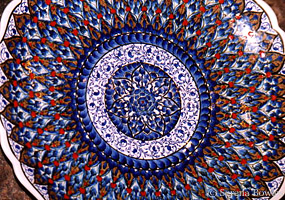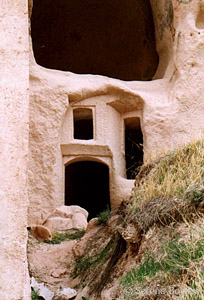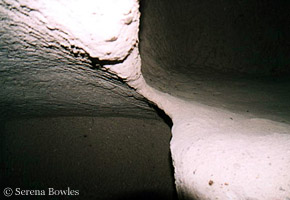The Story so far . . . After spending sometime exploring the Turkish capital of Istanbul, Natalie and I meet the rest of the passengers.
The following morning began with a meeting. First Jake explained to us what to expect from the trip, what our duties would be, where our kitty money would be spent, the sort of places we would be staying, and an abundance of other things. Once he had finished, the group introduced itself.
Natalie and I were the only Brits on board; most of the passengers came from Australia or New Zealand. The Australians were Joe, a guy from Cairns, who was returning to Australia soon after the end of this trip; Laura, who was doing this tour while her boyfriend had gone to visit his family; Valerie, on her way home after a number of years away; Jay who had also been travelling for some time; and Larry, a young Australian who had been in Europe on a year out, and was going back home to study.
The New Zealand contingent comprised of Jane and Lucy, who were both teachers and had been working in England; Tom, a crop sprayer from New Zealand; Charles, from Auckland; plus Debs and Rhonda, who had met working in a pub in England and, like us, would be continuing on through Africa to Cape Town once this tour was finished. Also on board were Vince, a laid back American; and Mark, a young South African who had been working with Larry in London. During the course of the meeting a dark-haired Australian had turned up, and introduced himself as Carl. He would be our driver, and had just started working for the company.
Jake collected the kitty money from us, and took us into the truck so we could stash the rest of our valuables in the strongbox that was to act as a safe. We would be able to have access to it at least once a day, usually when we arrived somewhere. We were instructed to refer to it as the fridge, to avoid drawing unnecessary attention to the large amount of money the truck was carrying.
We had been advised in pre-departure literature to bring the bulk of our spending money in cash, mainly small denomination notes. As Natalie and I were due to be away for nearly six months, we each had a daunting wad of notes, and were relieved to get it off our persons and into the safety of the "fridge".
We were assigned lockers and heaved our bags in them, before putting up our tents. Natalie and I placed our sleeping bags and ground mats inside the limp, A-frame tent, in preparation for our first night under canvas in more than fifteen years.
That done we strolled along the side of the busy dual carriageway with the rest of the group, sucking in exhaust fumes and sweating in the sun, until we reached a nearby suburb, where we changed money and ate before returning to camp.
The trip was a budget one, and we were all expected to help out with certain duties, including cooking. We had been told that we would be split into groups, and take it in turns. Whoever was on cooking duties would assist Jake with shopping for supplies, make the evening's meal, and prepare breakfast the following morning. This was something Natalie was not looking forward to.
"But I can't cook to save my life," she had wailed on numerous occasions back home. "How am I going to manage? It'll be awful."
"Well you'll just have to learn, won't you?" I had told her. "Don't worry about it, you'll probably come back a brilliant cook," I optimistically suggested. There were fifteen of us, so Jake split us into five groups of three. Natalie and I adopted Valerie, and we volunteered to cook first so we could get it out of the way.
The owner of the campsite, a large, jolly man named Ali, insisted that we have a barbecue and set off to the local butchers to buy some meat. That was all very well, but I'm a vegetarian and Valerie was a vegan. The three of us made a start on preparing the salad to go with the meal. Natalie and I discovered that we had a particular talent for chopping cabbage and grating carrots; coleslaw became a mainstay of all our subsequent meals.
On his return Ali began preparing the barbecue insisting on cooking the meat himself - getting no protest from us in the process. Natalie was given responsibility for flapping, and fanned the coals with a suitable implement. Jake decided she was not flapping sufficiently and took over this duty. We busied ourselves with dishing up the salad and the superbly prepared coleslaw, chatting easily with our new companions as the meal began.
The three of us got up before seven the next morning to prepare a breakfast of toast and cereal. Once the meal was finished and everything had been washed up and put away, we dismantled the tents, packed up any remaining belongings, climbed aboard the vehicle and settled into our seats; as the truck was only at half-capacity, there were plenty to choose from. At eight o'clock we pulled out of the service station, and began our journey to the town of Ecebat on the Gallipoli Peninsular, which was to be our home for the next two nights. The trip had begun in earnest.
Excitement levels were high, although tempered with some tension due to the date - it was September 11th 2002, and thoughts strayed to the events of the previous year. As we headed to Gallipoli, where we would make a tour of some of the battle sites of the First World War, I wondered whether we were on the brink of a Third World War.
Natalie and I sat at the front of the truck just above the cab, with windows ahead of us and to the side. I leaned out of the open window next to me and smiled as I watched the countryside roll by. That soon became my favourite pastime: sitting with my head poked out of the window, the wind whipping my face as I sniffed the air and soaked up the scenery. I watched the world unfold and thought my thoughts, loath to look away even for a moment, lest I miss something new and exciting.
Lunch was taken at a service station along the way, and we continued our journey after a burger - or just plain chips for us veggies. Not long into the afternoon we hit the coast. The day was hot, and the thought of a swim appealed to us all. Just before three we pulled up next to the Boomerang Bar, our home for the next two nights. It was built right on the beach, just off the road leading from the main highway through to the nearby town.
We parked up, and Jake climbed into the back of the truck. "All righty guys, this is camp! Pitch your tents anywhere you want, make sure you're this side of the rocks, or you might get rather wet in the night. If you walk along the beach for 20 minutes you hit town, where there is email and a few shops. Let's have dinner at eight . . . off you go."
Natalie and I settled on a spot about three metres from the shoreline and got the tent up as fast as we could, then changed into our swim things and jumped into the inviting sea. I waded past a few harmless jellyfish that floated in the surf line, and sunk into the wonderfully refreshing water - just what was needed after the heat of the day.
Once I had cooled off, I sat on the rocks reading while Natalie and most of the others played with a football in the water. I was pleased to see her having fun. The group seemed to have hit it off straight away, and already on day two felt like we had known each other for ages.
After dinner we walked into the small town, to a backpackers called TJ's, where we watched the film Gallipoli starring a young Mel Gibson. I knew little about the battles that had been fought in the region; the Australians and New Zealanders amongst us, however, were acutely aware of the history, as many ANZAC troops were among the allied casualties there.
The Gallipoli campaign was seen as a defining moment in the development of both Australia and New Zealand as distinct nations, separate from the British Empire. ANZAC spirit sums up the bravery, good humour, and mateship that the soldiers were famous for, and remains a strong source of pride for both countries. Many Antipodeans make the pilgrimage to Gallipoli to pay tribute to their fellow countrymen, particularly on 25th April - ANZAC day.
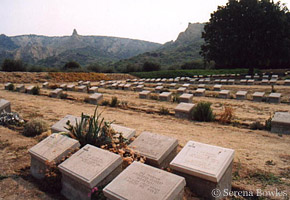
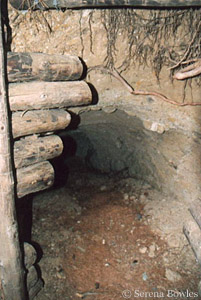
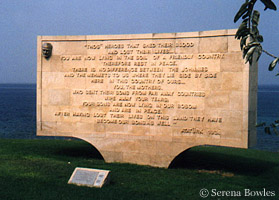
The following day's tour was interesting, informative, and of course sad. First of all our guide TJ spoke to us about the history of the area, and its strategic importance during the First World War.
We had a look around the small museum which contained memorabilia such as uniforms and bullets, as well as more emotive items like photographs, and extracts from soldiers' journals and letters home.
Afterwards we toured landing sites and battlefields; visiting graveyards, and monuments to the fallen on both sides. Around 10,000 ANZAC men were lost in the battle for Gallipoli, along with 22,000 British troops and 27,000 French; the Turkish forces lost 57,000. We stood on the road between the trenches of the opposing forces, merely metres apart, and looked down into the cramped, dark spaces. It was a sombre and thought provoking day.
Afterwards we went snorkelling on one of the wrecked boats. In total 216 vessels were sunk by the Turkish forces, as they approached the beaches in the hope of landing troops. We snorkelled out to a boat ten metres or so in length, which lay in shallow water not far from shore. It was now home to a variety of marine life, including a large octopus.
On our way back toward the beach we scanned the bottom for debris from the battle. The allied forces had been mown down as they waded toward the land, and many bullets remain in the area. After searching for twenty minutes or so I found one, corroded by years spent in the salty water, but still recognisable.
After an emotional day we all seemed similarly gripped by a compulsion to party that evening, maybe in celebration of life itself. Despite sadness at the events that had happened at Gallipoli, and the futility of war, there was also a feeling of hope and reconciliation, a desire that lessons be learnt. A monument marked with the words of Ataturk, says this:
Those heroes that shed their blood and lost their lives . . .
You are now lying in the soil of a friendly country. Therefore rest in peace.
There is no difference between the Johnnies and the Mehmets to us where they lie side by side here in this country of ours.
You, the mothers, who sent your sons from far away countries wipe away your tears, your sons are now lying in our bosom and are in peace.
After having lost their lives on this land they have become our sons as well.
In the morning we awoke to a soggy tent; Natalie and I hadn't noticed the rain during the night, and had failed covered our tent with the waterproof fly-sheet like every one else.
Damp and hungover we dismantled our tent, crawled aboard the truck, and were driven to the ferry terminal and on board a ferry to Canakkale. Once on the boat Natalie discovered that she had left behind her jumper, the sarong I had given her only hours earlier, and one contact lens. Thus began a trend that lasted the entire trip.
Carl drove the truck off of the ferry and through a bustling town. I leant out of a window at the back of the vehicle, straining to see everything and soak it all up. After a while we hit the open road, knowing we had an eight hour drive ahead of us before we reached our destination of Selçuk.
We had a brief stop at Troy, that famous city of old, where we remained unimpressed at a dull, wooden replica of the Trojan horse. For much of the day we passed fields full of low cotton plants, covered in white fluffy balls, which countless cotton pickers toiled over.
After lunch Jake asked if anyone wanted to sit up in the cab, and I jumped at the chance. The view was even better than from the back of the truck - and I vowed to ride up front as often as I could.
At one point we drove by a number of salt farms. I was surprised to see a flock of flamingos in one and later asked if anyone in the back had seen them - they hadn't, as they had all been busy playing cards, reading, talking, or sleeping. Each to their own, but it remained a mystery to me how people could do anything other than watch the captivating, ever-changing vista outside the window; I couldn't tear myself away.
We arrived in the town of Selçuk as the day's light began to fade, and made our way to a backpackers hostel where we pitched our tents. Jake arranged a group meal for us so we could relax for the evening and enjoy our environment, which included a pool and a bar.
The next morning we were up early to visit the main draw of the area: the ruins at Ephesus. At the site we located our fake student cards, which we had all purchased on the first day of the tour - except Larry and Mark, who had genuine ones. Ironically, whilst our bogus cards were accepted by the cashier and discounted entries allowed, the legitimate cards of the two bona fide students were refused, and the full entry fee demanded. The cashier was used to seeing the other style cards, so knew they must be valid, but had never seen real ones before. The boys later had to purchase fake cards from Jake to avoid a repeat of the situation, to our amusement and their dismay.
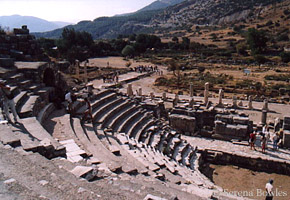
The city of Ephesus was home to one of the seven wonders of the ancient world: the Temple of Artemis, the goddess of fertility. A number of temples had previously stood on the same swampy site, but the last one topped them all. The building was 110 metres long and 55 metres wide, and built entirely of marble, with 127 columns supporting the roof, each 18 metres high. It took many decades to construct, and was still being built in 333 BC when Alexander the Great came to Ephesus.
The Goths destroyed the temple in 262 AD, by which time Ephesus - once a vital and thriving port - was stranded miles from the sea, as the river had silted up the bay where large ships had once docked.
We sat in the amphitheatre listening to our enthusiastic guide, a white-haired man called Harry, who gave us just the right amount of detail. He explained what everyday life would have been like in the city, and something of the achievements of Alexander the Great, but stopped before our eyes glazed over and we reached saturation point. With the best will in the world, there is only so much information you can take in over a short period of time.
We had been told that after the ruins we would get a free lunch and drink of our choice, and would have the opportunity to learn something about Turkish carpets . . . and if we wanted we could maybe buy one.
We arrived at the pleasantly cool underground showroom and were offered coke or wine. The owner explained to us how Turkish carpets are made, what some of the patterns mean, and how to spot a good quality rug from a bad one. Then a number of the carpets were spread out around the room, and we were invited to walk around on them in our bare feet - a recommended way to test for quality. I stopped at one stage and looked around the room - we looked insane walking up, down, and around silently staring down at our feet and the rugs beneath them.
Once this stage was completed we were invited again to sit down, and the owner's assistant brought out each rug one at a time. He opened it out with a small flourish and waited for us to shout out evet if we were interested in purchasing it, or olmaz if we were not.
When the selection process was finished we were left with a pile of rejected specimens, a smaller pile of possibles, and a handful of potential buyers. It was then that the lengthy procedure of bartering began with the interested few. The rest of us grew hungry and restless, and variously nattered and napped, waiting to eat and leave.
Some considerable time later the deals were done, and the promised pizzas ordered, delivered, and eaten. We thanked our hosts and started to leave the building. It was at that point that Tom decided he did want a carpet after all, and we groaned as the bartering business began again. This was a shrewd move on Tom's part, and he walked out of the shop with the best bargain of the bunch.
The carpet shop experience was a good one, but I did feel it was a shame that we had spent longer there than at the ruins - personally I would have preferred to spend the extra hours milling around lost in history.
By the time we arrived back at base, I was feeling hot and bothered. I had hoped that the laundry I'd put in would be dry, but instead I discovered that it had not yet been washed. I felt myself getting irrationally irritated, the humidity warming my temper, and took avoiding action by jumping into the pool fully clothed. A bit of a daft thing to do when you have only the bare minimum of clean, dry clothes, but it did help to cool off my hot head.
Feeling refreshed, I got out and walked around the pool towards the bar to get a cold drink. On the way I put my foot in an unnoticed hole and crashed to the floor with an intense, sickening pain as my ankle twisted. Unable to speak for a minute or two, I slid back over to the pool and dangled my damaged leg in the water, cursing my clumsiness.
I'd originally suffered a drunken sprain a couple of years previously - the day before my first (and last) skiing holiday, as luck would have it. It had never fully recovered, and was subsequently prone to twisting. The last time it had happened was during the World Cup. I had taken advantage of the pubs being open at six in the morning to develop a previously undiscovered interest in football. On leaving the pub at around nine in the morning, somewhat sozzled, I fell in the street and had to be picked up by a little old lady. If it were not for the alcohol, I would have been most embarrassed.
I felt somewhat aggrieved that on this occasion I could not even blame booze for my injury.
That evening the rain poured down, accompanied by a mighty storm of thunder and lightning. It was the turn of Debs, Rhonda, and Mark to cook, and none of us envied them as they battled against the elements. The rest of us sheltered in the manager's office, as there was not enough room for us all in the covered bar area. A waitress kindly came over to take our orders and deliver our cocktails - it's not easy being a backpacker.
As the food was dished up the lights went out, and we ate by candlelight. The rain continued unabated, and I watched as the pool first filled and then overflowed. There seemed no end in sight, so once we had tired of watching the lightning we had an early night.
When we awoke in the morning Natalie and I found out that our clothes had been washed and hung out just in time for the storm. We were not the only ones with wet stuff, as some of the lockers had leaked so badly that the contents were sodden. The deluge had proved too much for the fly-sheets, and our tents were soaked too.
We were due to leave at ten, but had a few false starts due to problems with the truck; I'm no mechanic, but apparently it was something to do with the gearbox. Carl managed to get it going in the end, with the assistance of Tom, who had a good working knowledge of engines. Several hours later than planned we set off for Pamukkale, famous for its hot springs and mineral terraces.
We were meant to be having our first rough camp that night - that is, finding a convenient stretch of ground to pitch up on, bushes for toilets and so on. Our late departure meant that it was getting dark before we neared the area Jake had planned for us to camp. At the side of the road were fields planted with cotton, and no suitable impromptu campsite was in evidence.
We came across a solitary guesthouse, and Jake got Carl to stop while he checked to see if the owner would allow us to camp in the grounds. He returned soon after to give us the news: we could . . . but for the same price we could have a few rooms to share.
The hotel was near to Pamukkale, so some of the passengers headed out to sample some underground hot springs. The idea sounded enticing, but more tempting was the thought of putting my foot up and having an early night. Since joining the trip my sleeping patterns and appetite had been extremely disrupted. I'm an insomniac at the best of times - it usually takes me at least an hour to get to sleep - but recently I had been waking up a number of times each night, lucky to sleep for more than two hours at a stretch.
I had no idea what was wrong with my appetite, as I can normally eat like a horse - albeit a rather fussy one. Of late I felt unable to manage more than a few mouthfuls of any meal. The cooking was hardly gourmet, but it wasn't that bad either; my loss of appetite did not reflect the quality of the meals.
Taking advantage of the situation I lay on the comfortable bed, and for a change I drifted off with no trouble at all. Unfortunately my peaceful slumber was not to last. Natalie and I were sharing a room with Carl, and around one o'clock they and Joe came back to the room to tell me all about their evening. They talked loudly for an hour or so, then Joe left, and Natalie and Carl both fell asleep . . . and I lay there wide awake, and unable to get back to sleep.
The longer I lay there, the less sleepy I felt. Being in a room with two people who were asleep - especially when they were the reason that I was not - did not help. By half past four I had all but given up, and decided somewhat irrationally to sleep outside, wrapped in a fly-sheet. I did drift off at some stage, but awoke exhausted the following day.
After breakfast we walked around the terraces, made from calcium deposited by the mineral-rich spring water. The sky was the colour of steel, and full of the promise of more rain to come. I walked on the white, sparkling ground, which resembled snow set into a thick, permanent crust. It was lumpy in parts, like wax dripped from a candle left burning too long.
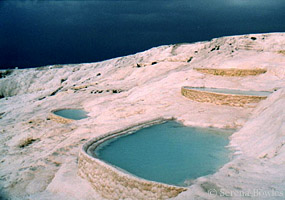
We stayed longer than we should have, and left as the bursting clouds unleashed their load. I jumped in the cab, where "I can see clearly now the rain has gone" was playing an inappropriate accompaniment. For the rest of that day the storm continued. We drove through towns where electricity poles were down and raging torrents took up half the road. Stopping for lunch at a supermarket, we jumped out of the truck and landed shin deep in water, which we had to wade through to reach the store.
That night we were definitely bush camping, and Jake jokingly asked if there were any special requests. "Yes," said Natalie. "I'd like somewhere nice and pretty, and some sunshine, please." We didn't fancy our chances.
As the day drew on Jake and Carl started to look out for a suitable spot. We had been driving alongside a large, sprawling lake for a number of kilometres. Its shores were low and boggy, but then we turned a corner and saw a large clearing, near to the lakeside but raised up a little. It was open and flat, but slightly sheltered from the road by a thin line of trees.
We pulled in cautiously as the rain stopped. A stony track led down from the road and, as we approached, we saw the area was a football field. Carl parked up on more solid ground while Jake strode around our potential site. He was a tall, gangling man, and we all looked on eagerly as he surveyed our possible home for the night with a look of authority on his face. To the west the sun found a gap between the clouds, and joined us as we watched Jake.
A man on a motorbike arrived, and we waited apprehensively, wondering whether he would start gesticulating, and evict us from this fine spot - but no, he regarded us with a happy grin, and seemed to hold no objection to us camping there. Having gained his silent permission, we got the thumbs up from Jake and leapt happily from the truck. As I looked back towards the truck I saw a wide, pale rainbow arching across the sky in the ultimate seal of approval. Natalie had her wish.
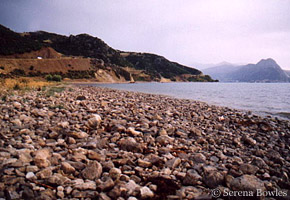
It was a fun evening, spent playing silly games around our first campfire, which set the mark for the rough camps to come. We awoke the next day to find ourselves faced with a radiant sight, as the early morning mist lifted off the lake, and the sun shone gently down. A pre-breakfast swim in the lake got the day off to a good start.
That day we drove to the town of Göreme, situated in the Cappadoccia region of Turkey. Nature and erosion have done strange things there, creating bizarrely shaped monoliths in various shades of pink. They are commonly known as "fairy chimneys", but to Jake they were the "large, penis shaped rocks"; both of these descriptions held true.
The soft volcanic rock is made up of pink and white layers, which erode at different rates. In some places smooth cones are left, and in others - where the layer on the top has worn down at a slower rate than that beneath it - wind carved stalks remain, topped with mushroom-shaped heads, all delicately coloured.
The malleable properties of the stone have traditionally been utilised by the indigenous people. Numerous troglodyte dwellings can be found in the area, carved both into and under the rock. These days the caves are often used as storage for local businesses, or the occasional novelty hotel.
We arrived late afternoon, when the pinky white of the rocks was complemented by a warm orange cast from the sinking sun. We stopped at a view point en route to our campsite, and I gazed out over miles of outlandish terrain as the sun set behind me. Down below an unobtrusive town sprouted up cheekily between the unusual columns of stone. It felt as if we were on another planet instead of in the south-eastern corner of Europe.
The following day we went on an excursion, stopping first at an open air museum. Here the rock was paler, almost white, resembling folds in a heavy cloth or thick icing drizzled generously over a cake. We were escorted by a sour-faced, irritable guide who - unlike the rest of the guides we had on the tour - did not seem to enjoy his work at all. He hurried us along the whole time, telling us little about the people who had lived there.
Each abode was arranged over a number of levels. The lower rooms in the base of the rock were used to stable the goats and other animals. Humans lived above them and pigeons roosted in the top caves. Shallow steps had been scooped out of the front of some homes, while at others more substantial stairs had been carved.
I imagined how it would have been: a bustling neighbourhood full of the smells of goats and donkeys, and the sounds of children playing; residents calling out to each other, scrambling up the walls to visit one another.
The hollowed-out caves had numerous windows, some neatly carved and others more ragged. Passageways led between some of the caverns, and we explored some of these, helping each other through the more tricky sections while our guide tapped his foot impatiently.
On leaving the museum we visited a local pottery, which used caves as storage space. Here we were given a demonstration and talk, as well as the expected sales pitch. Once that was finished we were left to wander around the large, cool underground display rooms which were filled with colourful pieces. Blue was a popular glaze, ranging from the pale colour of a spring sky to a deeper, cobalt blue. Rich reds and warm browns were also in abundance, and lively geometric patterns complemented graceful contours to produce attractive pots and striking plates.
After lunch we went to visit an underground city dating back over 2000 years. Although it was never permanently populated, the complex was a handy haven for the nearby town over the centuries, used in particularly cold winters or at times of impending war. The honeycombed rooms were staggered in an ingeniously space-saving way, offering an extensive, maze-like living area that would have been able to accommodate a large number of people.
